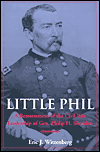 How do you assess a reputation?
How do you assess a reputation?Carefully, very carefully. As to what "carefully" means, the choices seem to be:
Analytically. This is a strong card to play in the "did it happen" round but less useful in vaguer appreciations such as of goodness, intentions, and capability. In Little Phil, Eric Wittenberg has written an analytic study of Sheridan’s, his model of analysis being the legal brief.
Narratively. This involves telling or retelling a tale to establish or revise a reputation. Narrative slights evidence to a greater or lesser extent. Jim Ridgway has written a narrative revisiting McClellan’s military performance in a retelling; Ethan Rafuse has retold the McClellan story through the filter of deeply-held Whiggish political beliefs.
Comparatively. This involves telling parallel stories or making comparative analysis. Tom Rowland attempted to revisit McClellan’s reputation by comparing historians’treatments of Grant and Sherman on one hand and McClellan on the other.
I mention McClellan books here because the reassessment of McClellan upwards and of Sheridan downwards are sides of the same coin, operationally; and as founder of the McClellan Society, I have given a lot of thought to the how-to in this.
Eric Wittenberg's approach represents my own best choice for a debunking effort: analytic. I early on rejected the comparative and narrative approaches. Furthermore, I have also tended towards the lawyerly handling of debunking evidence (as can be seen in some seven-year-old posts here and here).
But I never gained the confidence to try the analytic approach in a book-length revisit of the current McClellan legend. I had decided it couldn't be done; too many worries about context and loose ends and nailing the details. My opinion on this was hard and fast.
The trouble facing me in reading Little Phil, then, was that if the author succeeded in what he was trying to do, I would be proven wrong and have to revisit a large, dormant project. His success and my reading enjoyment would cause me a major (painful) rethink.
Constantly asking others to rethink - as I do - doesn't mean I wish that hardship on myself. Thus I started a read biased against the book.
[More tomorrow...]



